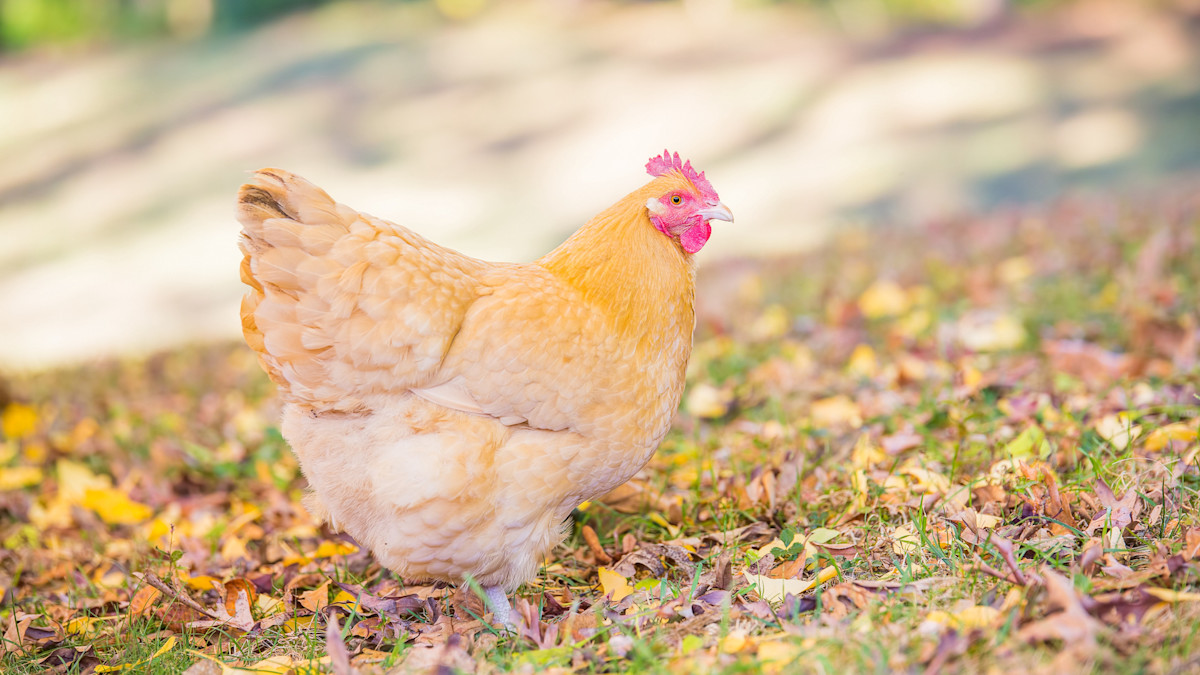
I may have found the perfect chicken. It’s crazy, I know, but hear me out on this one. For quite awhile, I’ve been thinking about what my ideal breed of chicken would look like, considering all the needs this chicken would have to meet. And, after coming up with a list of traits that were important to my tiny little homestead, I found the Buff Orpington is my perfect chicken. Here’s why.
Slow-Growing
First, I needed a chicken that reached fairly hefty weights with the intention of putting a few bulky hens in the freezer in the fall. The Orpington hen averages between six and eight pounds, which is the ideal weight for a meat chicken as far as I’m concerned.
On the other hand, I didn’t want a bird that would be ready for processing after only eight to ten weeks. Orpingtons grow much slower than the meat chickens I’d raised prior that tended to have terrible bone fractures from their bodies sustaining their weight. This, as you can imagine, was less than pleasant to deal with, and I swore I’d never have fast-growing birds again.
Enter the Orpington, which is ready to be processed and sent to the freezer somewhere between 16 and 20 weeks. They’re active foragers, yet weigh enough that they won’t be prone to flying over fences, which I consider a win-win.
Even Temperament
Ideally, if my meat birds are out scratching around in the yard, foraging for whatever they might find, I’d like them to lean towards the docile side. High-strung birds can be an absolute nightmare to deal with, especially if they need medical attention. For that reason, I need a bird that won’t run away when I gently reach for it.
Of course, no one can promise that every single chicken will be like this, but some breeds are more prone to being laid back and docile, which is why the Orpington is my MVP. They’re also especially good around children, too.
A general rule for chickens is that hens will hold a gentle demeanor, but roosters can be downright barbaric. However, after hearing accounts from other homesteaders, I’m told even the Buff Orpington roosters are particularly mild-mannered.
Healthy Egg Production
Egg production is a necessity because we sell our chicken eggs to a handful of locals who sought a better quality product than what the grocery store sells. Because of this, I need my hens to produce plenty of eggs throughout the year, and the Orpington meets this requirement as well.
The average Orpington hen will lay anywhere from 200 to 290 large brown eggs per year, which is more than enough, especially if you have multiple hens—frankly, I can’t think of a single reason why you wouldn’t want more than one.
Because this breed is quite a bit larger and has denser plumage, they have been known to go through long periods of molting—where birds shed their current feathers and make way for new ones, typically in the spring and fall. When birds go through this, they’ll cease all egg-laying activities to divert the energy needed toward making new feathers. Keep this in mind in case you find your birds haven’t laid an egg in quite some time. It could take weeks.
Born to Brood
My favorite aspect of this breed, by far, is their willingness to set a clutch of eggs consistently and hatch them. Buff Orpington hens are fantastic mothers and, because of their large size, can hatch more eggs than standard-sized breeds.
While I generally use my chickens for egg and meat production, it can also be expensive to invest in hatching eggs or chicks every year. It gets expensive, and sourcing chicks can be a real hassle. This is where Orpingtons shine once more because they’ll do all of that work for you, and if you have two or three hens, a smart homesteader can have one hen go broody while the other two hens continue to produce fresh brown eggs. If you’re using this strategy, remember to keep one eager rooster around to ensure that your hens’ eggs are fertilized.
As far as I’m concerned, there’s no downside to the Buff Orpington. And, while I choose the Buff, there is also an assortment of other Orpington varieties that deserve equal praise. I know every homesteader’s situation is different.
This breed may not be right for you, but there are many other dual-purpose breeds that can fill the niche you need. As with anything else, do your research and make sure you know exactly what you want, which is key for investing in any bird. As they say, it’s always better to have your ducks in a row. Or in this case, hopefully, your Orpingtons.





Conversation